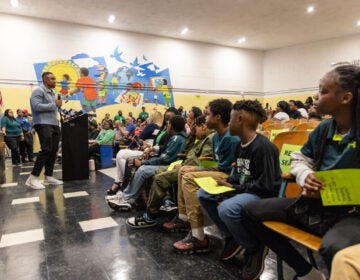Philadelphia mayor’s education office seeks to lift the veil on charter board meetings
Seeking to better understand the operations of Philadelphia’s 80-plus public charter schools, Mayor Michael Nutter’s Office of Education has launched an effort to get boots on the ground at charter board meetings all across the city.
Lori Shorr, the mayor’s chief education policy adviser, has directed members of her staff to begin attending several such meetings a month.
“We put a lot of public dollars into these schools, and they’re serving a lot of kids in this city,” said Shorr. “How they’re governed is important.”
Philadelphia’s School Reform Commission, whose five members are appointed by either the mayor or the governor, is the ultimate authority over the city’s 242 traditional public schools. The SRC’s monthly meetings, where policy decisions and contract awards are made, are televised live and streamed online. The meetings regularly attract hundreds of parents, advocates, and school staff.
However, each of the city’s charter schools, publicly funded but independently managed, is governed by its own nonprofit board of directors.
A recent review by Shorr’s office found that only about half of Philadelphia charters had posted board meeting schedules on their websites. It raised a concern that parents and members of the public might be missing out on opportunities to engage the decision-making process at schools that now collectively educate about 60,000 children and receive hundreds of millions of dollars in taxpayer funds.
So far, staff from the mayor’s Office of Education have attended board meetings of Laboratory, Folk Arts and Cultural Treasures, World Communications, and Mariana Bracetti charter schools.
“It’s not that radical a move,” said Shorr. “These are public meetings, and people should be at them.”
Lawrence Jones, the CEO of the Richard Allen Preparatory Charter School in West Philadelphia, agreed.
More scrutiny on charter board meetings, he said, could both enhance accountability and make Philadelphians more aware of the issues charters face.
“I don’t see how anyone could argue this,” said Jones. “It gives more credibility to the fact that charters are public schools and part of the public education landscape.”
Jones said that many Philadelphia charters seek to schedule parent meetings and board meetings on the same day in order to encourage attendance.
He cautioned, though, that people shouldn’t expect — or want — independent charter school boards to operate in the same way as the SRC.
“Establishing bureaucracy does not necessarily indicate accountability,” said Jones. “We want to preserve [the flexibility] that makes it easier for charters to mobilize and meet the needs” of parents and communities.
No central listing of Philadelphia charter school boards, their members, or their meeting schedules is currently available.
—
This story was reported through a partnership in education coverage between WHYY/NewsWorks and the Public School Notebook.
WHYY is your source for fact-based, in-depth journalism and information. As a nonprofit organization, we rely on financial support from readers like you. Please give today.




